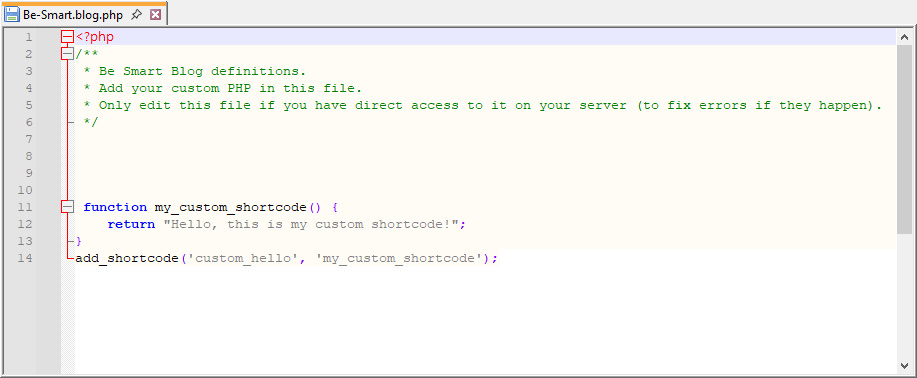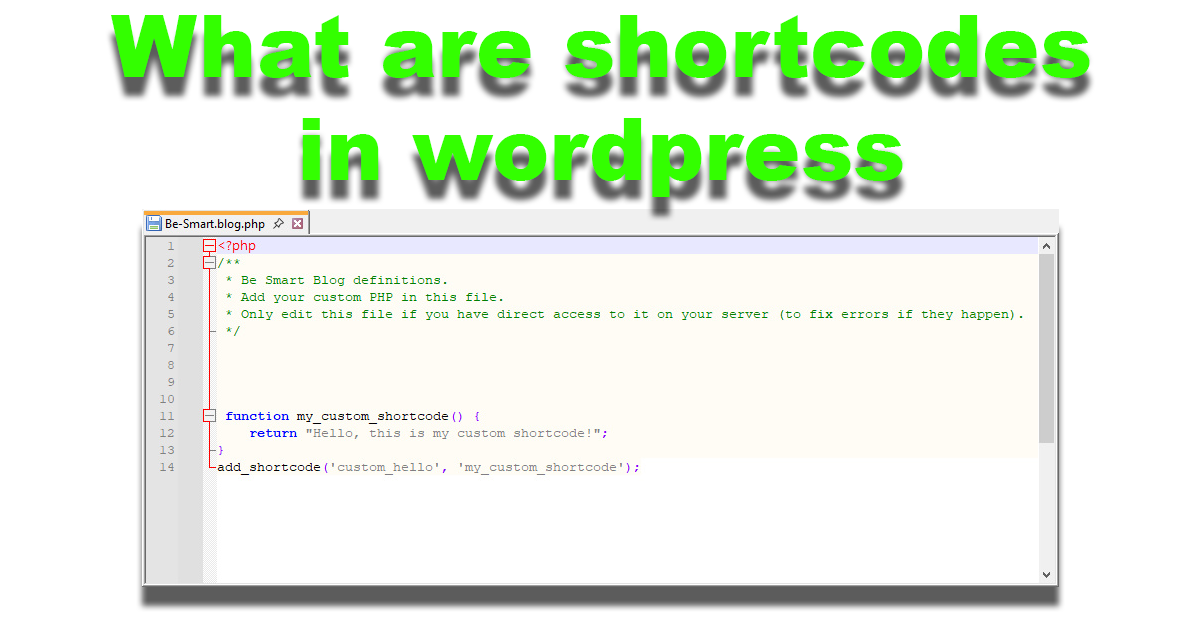Estimated Reading Time: 5 min
In WordPress, shortcodes are small code snippets enclosed in square brackets ([ ]) that allow you to execute predefined functionality or embed dynamic content within posts, pages, or widgets without writing complex code. Here’s a quick overview:
Common Uses of Shortcodes
- Embedding Media:
[g allery],[v ideo],[a udio] - Forms: Embedding forms using plugins like Contact Form 7 or WPForms (e.g.,
[contact-form-7 id="123" title="Contact form"]) - Buttons: Adding styled buttons.
- Sliders: Inserting image or content sliders.
- Columns: Creating multi-column layouts.
- Custom Features: Embedding custom functionality via third-party plugins or custom code.
Examples of Built-in WordPress Shortcodes
- Gallery:
[g allery ids="1,2,3"] - Audio:
[a udio src="audio.mp3"] - Video:
[v ideo src="video.mp4"] - Embed Content:
[e mbed]URL[/embed]
How to Add Shortcodes
- Simply insert the shortcode in the post/page editor where you want the functionality.
- Example:
[my_shortcode]
Creating Custom Shortcodes
You can define your own shortcode using the add_shortcode function in your theme’s functions.php file:
function my_custom_shortcode() {
return "Hello, this is my custom shortcode!";
}
add_shortcode('custom_hello', 'my_custom_shortcode');

- Use
[custom_hello]to display “Hello, this is my custom shortcode!” in your content.
Shortcode Best Practices
- Avoid nesting too many shortcodes for better readability.
- Use plugins like Shortcoder or Custom Shortcodes to manage and organize custom shortcodes easily.
- Test shortcodes thoroughly to ensure compatibility with themes and plugins.
Let me know if you’d like help creating a specific shortcode!
Examples of custom WordPress shortcode functions, which you can add to your theme’s functions.php file or a custom plugin to create useful features:
1. Hello World Shortcode
Displays a simple “Hello, World!” message.
function hello_world_shortcode() {
return "Hello, World!";
}
add_shortcode('hello_world', 'hello_world_shortcode');
Usage: [hello_world]
2. Current Year
Displays the current year dynamically.
function current_year_shortcode() {
return date('Y');
}
add_shortcode('current_year', 'current_year_shortcode');
Usage: [current_year]
3. Button Shortcode
Creates a styled button with a customizable URL.
function button_shortcode($atts) {
$atts = shortcode_atts([
'url' => '#',
'text' => 'Click Here',
], $atts);
return "<a href='{$atts['url']}' class='button'>{$atts['text']}</a>";
}
add_shortcode('button', 'button_shortcode');
Usage: [button url="https://example.com" text="Learn More"]
4. YouTube Embed
Embeds a responsive YouTube video.
function youtube_embed_shortcode($atts) {
$atts = shortcode_atts(['id' => ''], $atts);
return "<iframe width='560' height='315' src='https://www.youtube.com/embed/{$atts['id']}' frameborder='0' allowfullscreen></iframe>";
}
add_shortcode('youtube', 'youtube_embed_shortcode');
Usage: [youtube id="dQw4w9WgXcQ"]
5. User Greeting
Greets the logged-in user or displays a default message for guests.
function user_greeting_shortcode() {
if (is_user_logged_in()) {
$user = wp_get_current_user();
return "Hello, " . esc_html($user->display_name) . "!";
} else {
return "Hello, Guest!";
}
}
add_shortcode('user_greeting', 'user_greeting_shortcode');
Usage: [user_greeting]
6. Current Date
Displays the current date in a specific format.
function current_date_shortcode($atts) {
$atts = shortcode_atts(['format' => 'F j, Y'], $atts);
return date($atts['format']);
}
add_shortcode('current_date', 'current_date_shortcode');
Usage: [current_date format="l, F j, Y"]
7. Recent Posts
Displays a list of recent posts with links.
function recent_posts_shortcode($atts) {
$atts = shortcode_atts(['count' => 5], $atts);
$posts = wp_get_recent_posts(['numberposts' => $atts['count'], 'post_status' => 'publish']);
$output = '<ul>';
foreach ($posts as $post) {
$output .= "<li><a href='" . get_permalink($post['ID']) . "'>" . esc_html($post['post_title']) . "</a></li>";
}
$output .= '</ul>';
return $output;
}
add_shortcode('recent_posts', 'recent_posts_shortcode');
Usage: [recent_posts count="3"]
8. Custom Google Map
Embeds a Google Map with a specified address.
function google_map_shortcode($atts) {
$atts = shortcode_atts(['address' => ''], $atts);
$encoded_address = urlencode($atts['address']);
return "<iframe width='600' height='450' style='border:0' loading='lazy' allowfullscreen src='https://www.google.com/maps/embed/v1/place?q={$encoded_address}&key=YOUR_API_KEY'></iframe>";
}
add_shortcode('google_map', 'google_map_shortcode');
Usage: [google_map address="1600 Amphitheatre Parkway, Mountain View, CA"]
9. FAQ Toggle
Creates a collapsible FAQ section.
function faq_toggle_shortcode($atts, $content = null) {
$atts = shortcode_atts(['title' => 'FAQ'], $atts);
return "<div class='faq'><h3>{$atts['title']}</h3><div class='faq-content' style='display:none;'>{$content}</div></div>";
}
add_shortcode('faq', 'faq_toggle_shortcode');
Usage: [faq title="What is WordPress?"]WordPress is a content management system.[/faq]
10. Custom Image
Displays an image with a caption.
function custom_image_shortcode($atts) {
$atts = shortcode_atts([
'src' => '',
'alt' => '',
'caption' => '',
], $atts);
return "<figure><img src='{$atts['src']}' alt='{$atts['alt']}'><figcaption>{$atts['caption']}</figcaption></figure>";
}
add_shortcode('custom_image', 'custom_image_shortcode');
Usage: [custom_image src="image.jpg" alt="An example image" caption="This is an example image."]
These examples demonstrate how shortcodes can simplify complex tasks and add dynamic content to your WordPress site. Let me know if you’d like to explore a specific shortcode in more detail!

